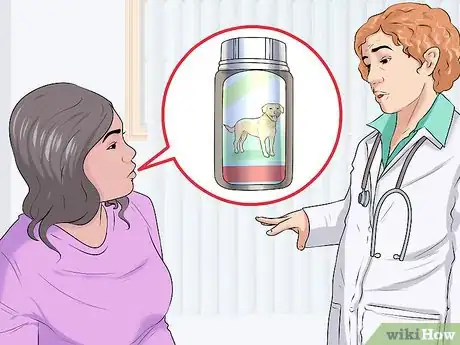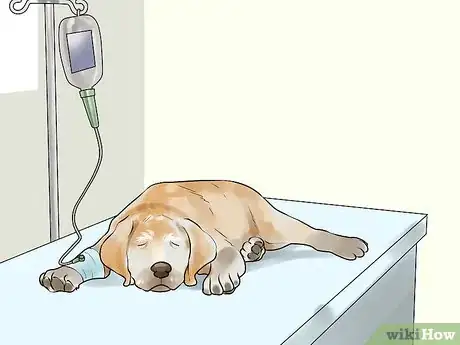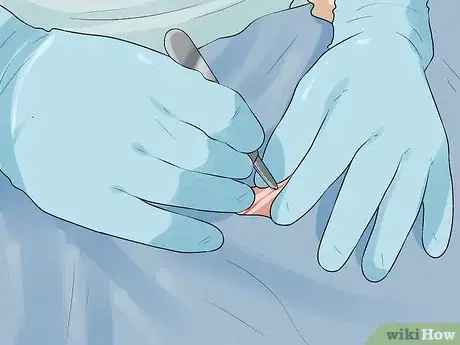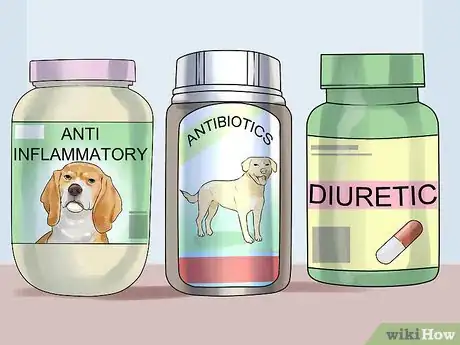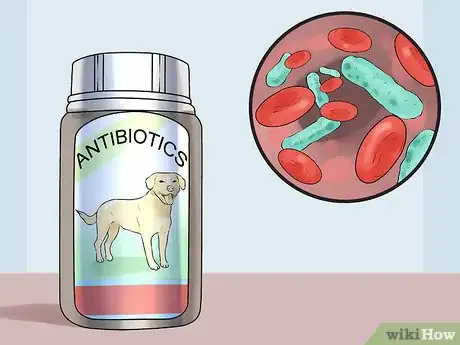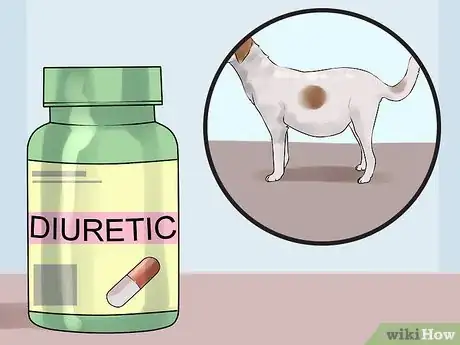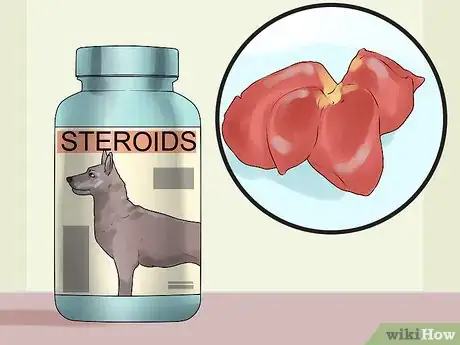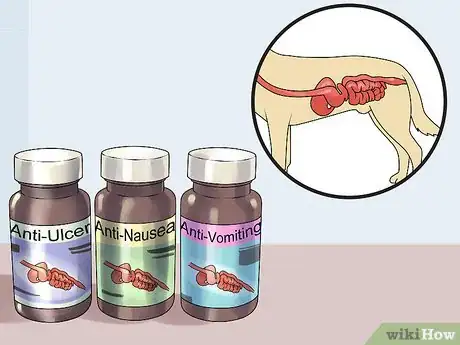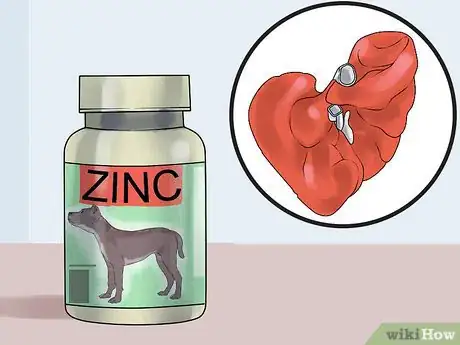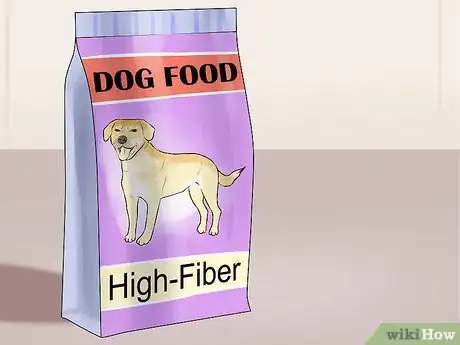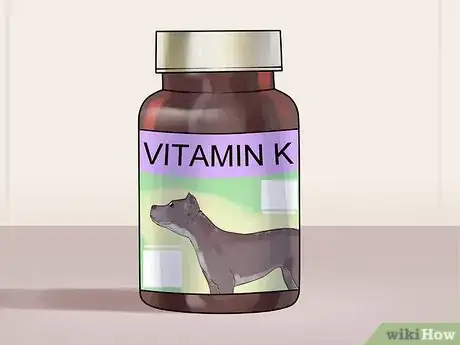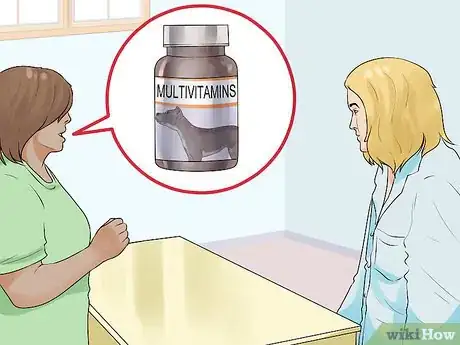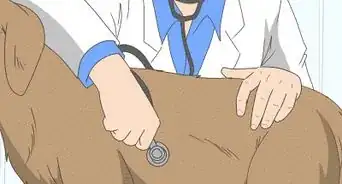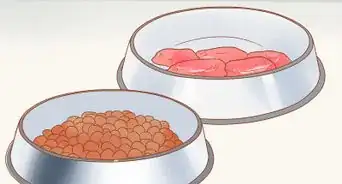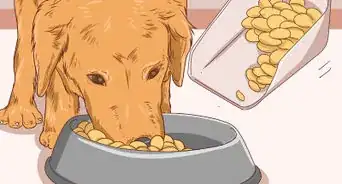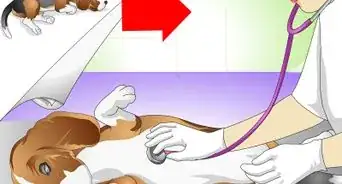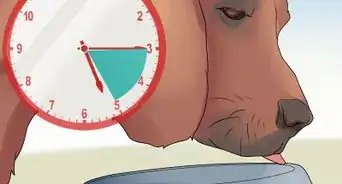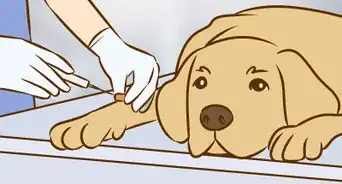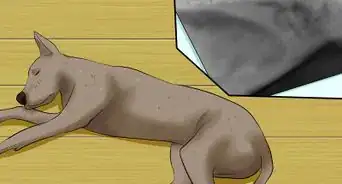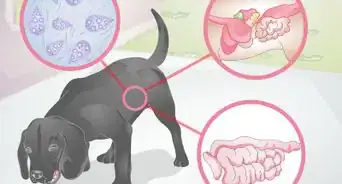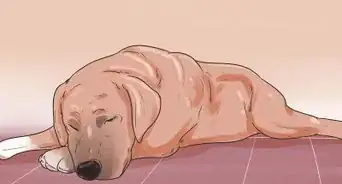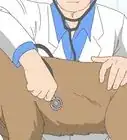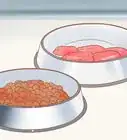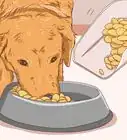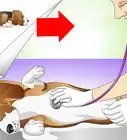This article was co-authored by Pippa Elliott, MRCVS. Dr. Elliott, BVMS, MRCVS is a veterinarian with over 30 years of experience in veterinary surgery and companion animal practice. She graduated from the University of Glasgow in 1987 with a degree in veterinary medicine and surgery. She has worked at the same animal clinic in her hometown for over 20 years.
There are 8 references cited in this article, which can be found at the bottom of the page.
This article has been viewed 15,952 times.
The liver plays many important roles in a dog’s body, including breaking down toxins and drugs, storing nutrients, and maintaining normal blood glucose levels.[1] Although the liver is a very powerful organ, it can weaken as a dog ages. When the liver no longer works very well, liver disease can develop. If your vet has diagnosed a liver disease in your older dog, work with your vet to develop a treatment plan that includes veterinary care, medication, and dietary changes.
Steps
Receiving Veterinary Care
-
1Discuss treatment options with your vet. Older dogs are prone to certain liver diseases, such as chronic hepatitis (liver inflammation), liver cancer, and cirrhosis (end-stage liver disease).[2] These diseases are not curable, but can be managed. When you talk with your vet about treatments for your older dog’s liver disease, consider asking these questions:
- Will my dog need a lot of medications?
- Will my dog need to stay on the medications for the rest of its life?
- When will my dog start getting better?
- Will I need to change my dog’s diet?
- Will surgery help my dog?
-
2Hospitalize your dog. Because liver disease can be difficult to diagnose in dogs, your older dog’s liver disease may be advanced by the time your vet makes the diagnosis. Advanced liver disease can make dogs very sick. If your dog is really sick, your vet will want to hospitalize your dog to begin treatment. Examples of in-hospital treatment are:[3]
- Intravenous fluids to rehydrate your dog
- Vitamin supplementation in the fluids to correct nutrient deficiencies
- Assisted feeding, in case your dog is not strong enough to eat on its own
- Lactulose to prevent ammonia production and absorption
Advertisement -
3Allow your vet to perform surgery. Surgery is a possible treatment option for a few liver diseases. If your older dog has cancer in one liver lobe (the liver has multiple lobes), your vet could surgically remove the affected lobe. If your dog has a liver shunt, which prevents blood from circulating through the liver, your vet could surgically close the shunt.[4]
- Realize that, if your dog is extremely sick from its liver disease, surgery may not be a good choice.
- Not all forms of liver cancer in older dogs can be treated with surgery.
- Chemotherapy is a treatment option for liver cancer if your dog cannot undergo surgery.
- Closing off liver shunts can be a complicated surgery. Your vet may refer you to a veterinary surgeon if you want your dog to undergo the procedure.
Treating with Medication
-
1Decide which medications your dog will need. Several medications, such as antibiotics and anti-inflammatory drugs, are available to treat liver disease in older dogs. After diagnosing which type of liver disease your dog has, your vet will talk with you about which medications will work best in your dog.
-
2Give your dog antibiotics. Certain liver cells are responsible for breaking down and eliminating substances like bacteria and toxins. With liver disease, these cells stop working properly, causing bacteria to eventually buildup in the blood stream. This can lead to a serious bacterial infection called septicemia.[5] Your vet will prescribe an antibiotic to treat this infection.
-
3Administer a diuretic. Liver disease can cause a buildup of fluid in the abdomen, a condition called ascites. If your dog has ascites, your vet will prescribe a diuretic. The diuretic will cause your dog to urinate more frequently, removing the excess fluid.[6]
- Severe ascites can enlarge a dog’s abdomen so much that breathing becomes difficult.[7] If your dog has ascites, do not leave it untreated.
- To prevent accidents in the house, be ready to take your dog outside more frequently so it can urinate.
-
4Use an anti-inflammatory medication. If your older dog has chronic hepatitis, your vet will prescribe a medication, such as a steroid, that will decrease inflammation and help protect the liver.[8] Steroids can have several negative side effects, such as GI ulcers, intestinal bleeding, and fluid retention.[9]
- Your vet will need to carefully monitor your dog if it is on steroids.
-
5Treat your dog’s digestive upset. Liver disease can upset a dog’s digestive system. Sometimes, the disease can cause stomach ulcers. If your older dog has a stomach ulcer, your vet will prescribe an anti-ulcer medication. This medication will help your dog feel better and want to eat.[10]
-
6Give your dog zinc. Liver disease can cause copper to build up in the liver’s cells. This extra copper causes liver inflammation and scarring. If your older dog has chronic hepatitis, your vet will prescribe zinc for your dog. Zinc will help prevent copper from building up in your dog’s liver.[14]
Changing Your Dog’s Diet
-
1Feed your dog a new diet. Dietary changes are also needed to treat liver disease in older dogs. Different liver diseases will require different diets. Your vet will recommend the diet that will best meet your dog’s nutritional needs. These diets are available through your vet. Examples of these diets are:
-
2Add vitamin K to your dog’s diet. Vitamin K and certain liver proteins play important roles in blood clotting. Your dog gets Vitamin K through its diet. Because liver disease can prevent these blood-clotting proteins from working properly, your dog will need vitamin K to prevent bleeding problems.[19]
- Check the vitamin K levels in your dog's new diet. If the vitamin K levels are too low, your vet may recommend a vitamin K supplement.
-
3Give your dog an antioxidant. Antioxidants neutralize free radicals, which are chemicals produced in the body that can damage organs. To prevent your older dog’s liver from getting damaged by free radicals, give your dog an antioxidant like vitamin E or SAMe.[20]
- Your dog may receive enough vitamin E in the food it eats. Ask your vet if your dog will need a vitamin E supplement.
- SAMe is given as a supplement.
-
4Consider giving your dog a daily multivitamin. In addition to vitamins E and K deficiency, liver disease can also cause a vitamin A deficiency in older dogs. Your dog may need a multivitamin to prevent other nutrient deficiencies.[21] Ask your vet for recommendations on which daily multivitamin would be best for your dog.
Warnings
- Certain types of liver cancer in older dogs carry a poor prognosis.[23]⧼thumbs_response⧽
References
- ↑ http://www.abbey-vetgroup.co.uk/Dogs_Liver_Conditions.html
- ↑ http://www.abbey-vetgroup.co.uk/Dogs_Liver_Conditions.html
- ↑ http://www.lbah.com/word/liver-disease-summary-page/
- ↑ http://www.lbah.com/word/liver-disease-summary-page/
- ↑ http://www.lbah.com/word/liver-disease-summary-page/
- ↑ https://bluepearlvet.com/medical-articles/chronic-hepatitis-in-dogs/
- ↑ http://www.lbah.com/word/liver-disease-summary-page/
- ↑ http://www.2ndchance.info/hepatitis.htm
- ↑ http://www.merckvetmanual.com/digestive-system/hepatic-disease-in-small-animals/canine-chronic-hepatitis
- ↑ http://www.lbah.com/word/liver-disease-summary-page/
- ↑ http://www.merckvetmanual.com/digestive-system/hepatic-disease-in-small-animals/canine-chronic-hepatitis
- ↑ http://www.2ndchance.info/hepatitis.htm
- ↑ https://todaysveterinarypractice.com/gi-intervention-approach-to-diagnosis-therapy-of-the-vomiting-patient/
- ↑ http://www.lbah.com/word/liver-disease-summary-page/
- ↑ http://www.vetmed.ucdavis.edu/vmth/small_animal/nutrition/client_info_sheets/encephalopathy.cfm
- ↑ http://www.lbah.com/word/liver-disease-summary-page/
- ↑ http://www.merckvetmanual.com/digestive-system/hepatic-disease-in-small-animals/canine-chronic-hepatitis
- ↑ http://www.abbey-vetgroup.co.uk/Dogs_Liver_Conditions.html
- ↑ http://www.lbah.com/word/liver-disease-summary-page/
- ↑ http://www.vetmed.ucdavis.edu/vmth/small_animal/nutrition/client_info_sheets/encephalopathy.cfm
- ↑ http://jn.nutrition.org/content/128/12/2733S.full
- ↑ https://bluepearlvet.com/medical-articles/chronic-hepatitis-in-dogs/
- ↑ http://www.lbah.com/word/liver-disease-summary-page/
About This Article
To treat liver disease in your older dog, talk to your vet about which treatment option will work best for your pup. For example, your vet may prescribe antibiotics to kill bacteria in your dog’s blood stream. Alternatively, if your dog has a build-up of fluid in its abdomen, it may need a prescription diuretic. Keep in mind that diuretics will make your dog urinate more, so you’ll need to take it outside more frequently for potty breaks. Besides medication, your vet may recommend that you change your dog’s diet to treat liver disease. Depending on the type of liver disease it has, you may need to feed your dog a low-copper, low-protein, or low-sodium dog food to help manage its condition. To learn how to treat doggy stomach ulcers caused by liver disease, read more from out Veterinary co-author.
